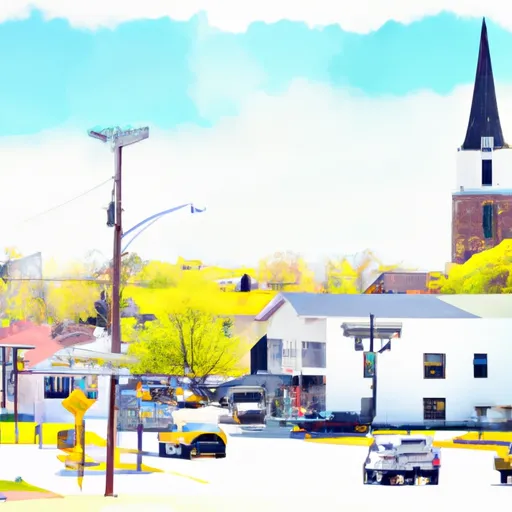-
 Snoflo Premium
Snoflo Premium
Get unlimited access to all our content
With no Ad interruptions! - Start Your Free Trial Login with existing account
Montague
Eden Index
Climate
7.3
•
Recreation
4.5
•
Community
3.0
•
Safeguard
5.2/10

Located in Muskegon County, Montague is a charming city in the state of Michigan, USA. Montague experiences a humid continental climate, characterized by warm summers and cold winters. Average temperatures range from 20°F (-6°C) in winter to 80°F (27°C) in summer, making it an ideal place for year-round outdoor activities.
The city is blessed with an abundance of natural resources, including stunning water bodies like White Lake and the White River. These hydrological constituents contribute to various recreational opportunities. Fishing enthusiasts can indulge in a variety of species such as salmon, trout, and bass. Boating, kayaking, and paddleboarding are also popular activities on the crystal-clear waters.
Montague is a paradise for nature lovers, with its scenic trails and parks. The Hart-Montague Trail State Park offers 22 miles of paved trails for biking and hiking, meandering through picturesque landscapes. The White River Light Station is a must-visit site, showcasing Michigan's maritime history and offering panoramic views of Lake Michigan.
In summary, Montague, Michigan, offers a diverse climate that caters to outdoor activities throughout the year. Its hydrological constituents like White Lake and White River provide ample opportunities for fishing, boating, and water sports. With its stunning natural surroundings and recreational sites, Montague is a haven for outdoor enthusiasts.
What is the Eden Index?
The Snoflo Eden Index serves as a comprehensive rating system for regions, evaluating their desirability through a holistic assessment of climate health, outdoor recreation opportunities, and natural disaster risk, acknowledging the profound impact of these factors on livability and well-being.
Climate Health Indicator (CHI): 7.3
Montague receives approximately
865mm of rain per year,
with humidity levels near 81%
and air temperatures averaging around
9°C.
Montague has a plant hardyness factor of
6, meaning
plants and agriculture in this region thrive during a short period during spring and early summer. Most
plants will die off during the colder winter months.
By considering the ideal temperature range, reliable water supplies, clean air, and stable seasonal rain or snowpacks, the Climate Health Indicator (CHI) underscores the significance of a healthy climate as the foundation for quality living.
A healthy climate is paramount for ensuring a high quality of life and livability in a region, fostering both physical well-being and environmental harmony. This can be characterized by ideal temperatures, reliable access to water supplies, clean air, and consistent seasonal rain or snowpacks.
Weather Forecast
Streamflow Conditions
Northeastern Lake Michigan
Area Rivers
Northeastern Lake Michigan
Snowpack Depths
Northeastern Lake Michigan
Reservoir Storage Capacity
Northeastern Lake Michigan
Groundwater Levels
Recreational Opportunity Index (ROI): 4.5
The Recreational Opportunity Index (ROI) recognizes the value of outdoor recreational options, such as parks, hiking trails, camping sites, and fishing spots, while acknowledging that climate plays a pivotal role in ensuring the comfort and consistency of these experiences.
Access to outdoor recreational opportunities, encompassing activities such as parks, hiking, camping, and fishing, is crucial for overall well-being, and the climate plays a pivotal role in enabling and enhancing these experiences, ensuring that individuals can engage in nature-based activities comfortably and consistently.
Camping Areas
| Campground | Campsites | Reservations | Toilets | Showers | Elevation |
|---|---|---|---|---|---|
| Hurricane River - Pictured Rocks National Lakeshor | None | 625 ft | |||
| French Post Co Park | None | 552 ft | |||
| Twelvemile - Pictured Rocks National Lakeshore | None | 620 ft | |||
| Bass Lake State Beach | 60 | 716 ft | |||
| Shamrock Park | None | 608 ft | |||
| Tippecanoe River State Park | 120 | 705 ft | |||
| Kingston Lake - State Forest | 16 | 824 ft | |||
| Deer Creek Co Park | None | 702 ft | |||
| Little Beaver Lake - Pictured Rocks National Lake | None | 619 ft | |||
| Potato Creek State Park | 290 | 783 ft |
Nearby Ski Areas
Catastrophe Safeguard Index (CSI):
The Catastrophe Safeguard Index (CSI) recognizes that natural disaster risk, encompassing floods, fires, hurricanes, and tornadoes, can drastically affect safety and the overall appeal of an area.
The level of natural disaster risk in a region significantly affects safety and the overall livability, with climate change amplifying these risks by potentially increasing the frequency and intensity of events like floods, fires, hurricanes, and tornadoes, thereby posing substantial challenges to community resilience and well-being.
Community Resilience Indicator (CRI): 3.0
The Community Resilience Indicator (CRI) recognizes that education, healthcare, and socioeconomics are crucial to the well-being of a region. The CRI acknowledges the profound impact of these elements on residents' overall quality of life. By evaluating educational resources, healthcare accessibility, and economic inclusivity, the index captures the essential aspects that contribute to a thriving community, fostering resident satisfaction, equity, and social cohesion.

